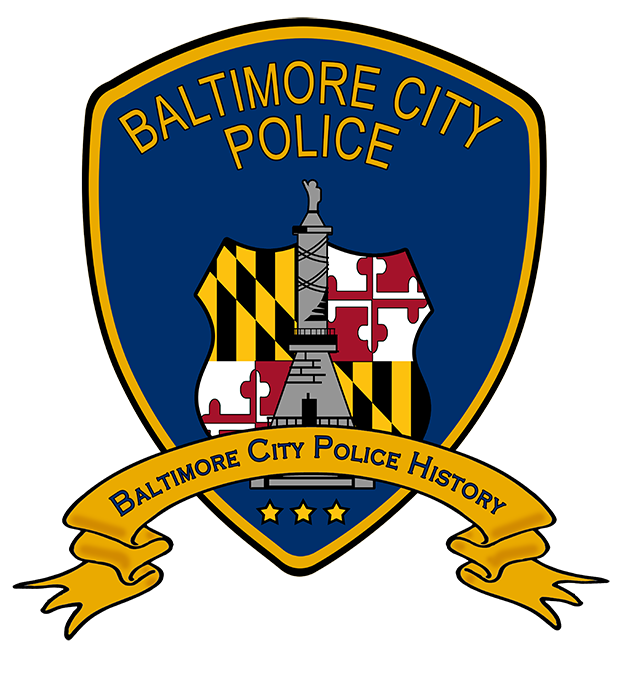Homicide
The Homicide Unit in our department is one of the most prestigious and well-known of the units, right up there with K-9 and the Aviation Unit. You will see our BPD Homicide personnel in action from the past up to the present and see how they have solved some of the worst crimes men can commit. Our own guys who have been able to bring closure to grieving families that have lost a family member
Homicide Unit
The History of the Baltimore Police Department's HOMICIDE UNIT
The Homicide Unit in our department is one of the most prestigious and well-known of the units, right up there with K-9 and the Aviation Unit. You will see our BPD Homicide personnel in action from the past up to the present and see how they have solved some of the worst crimes men can commit. Our own guys who have been able to bring closure to grieving families that have lost a family member Help us as we attempt to gather more information. If any former members can contribute, please send any information you have to: This email address is being protected from spambots. You need JavaScript enabled to view it.
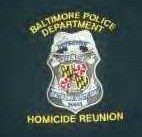
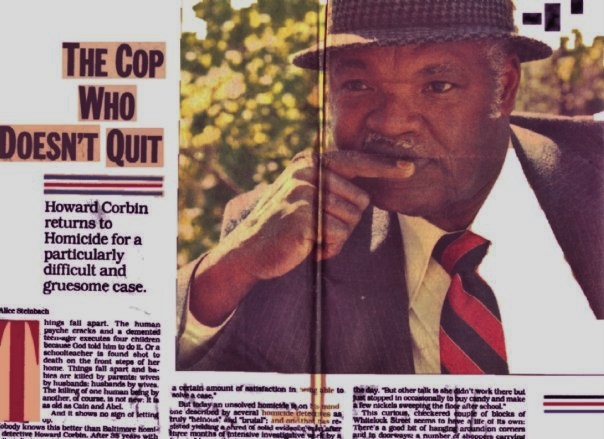
Photo courtesy Jt Brown
Detective Howard Corbin
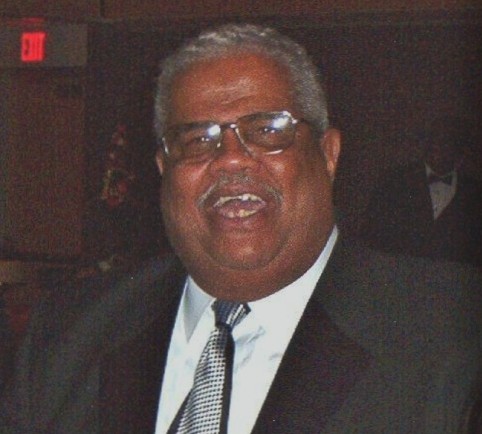
Photo courtesy Jt Brown
Detective Rick Oscar "Bunk" Requer
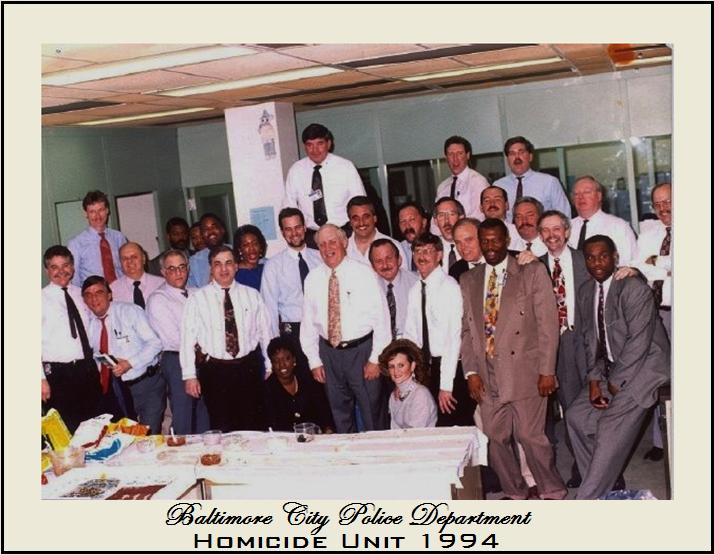
Photo courtesy Jt Brown
Baltimore City Police Department
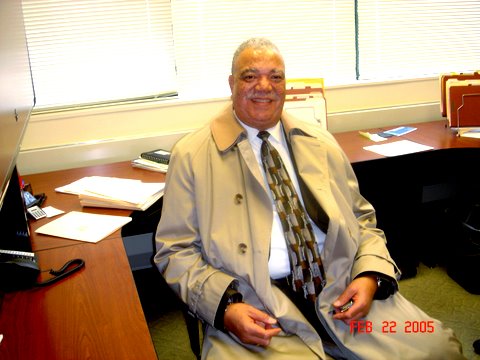
Baltimore City Police Department
Homicide Unit 1994

Photo courtesy Sgt. Jim Distler
Detective Daniel Boone
Detective Daniel Boone
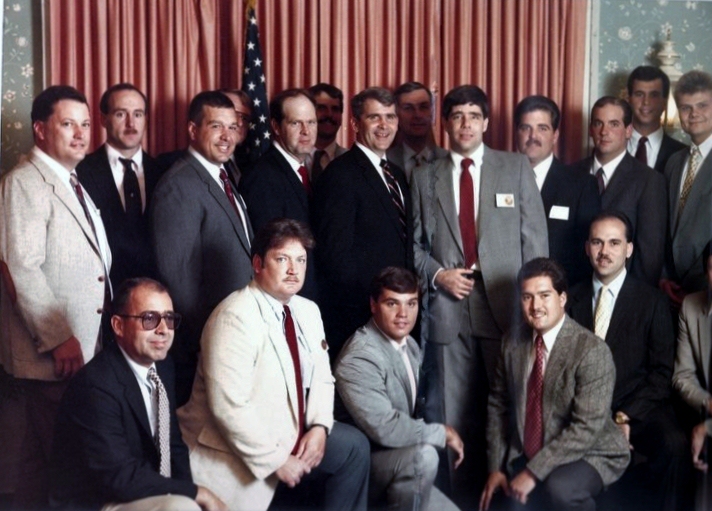
Homicide Unit
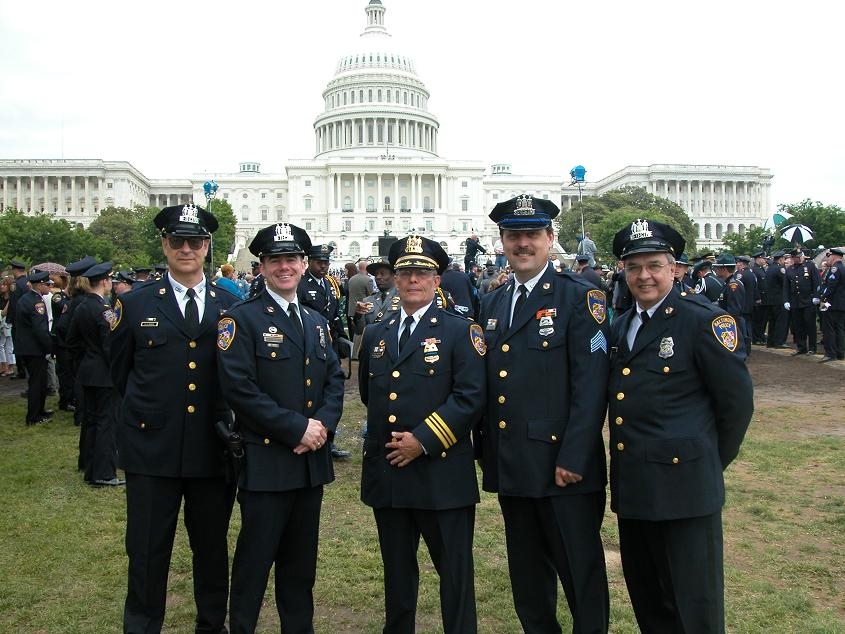 Photo courtesy Sgt. Steve Krause
Photo courtesy Sgt. Steve KrauseDet. Ron Berger, Det. Robert Cherry, Major Richard Faltheit,
Det. Mike Hammel and Sgt. Steve Krause at Police Week 2005 in front of the U.S. Capitol
They were all in the Homicide Unit at the time. All are now retired, except for Bob Cherry.
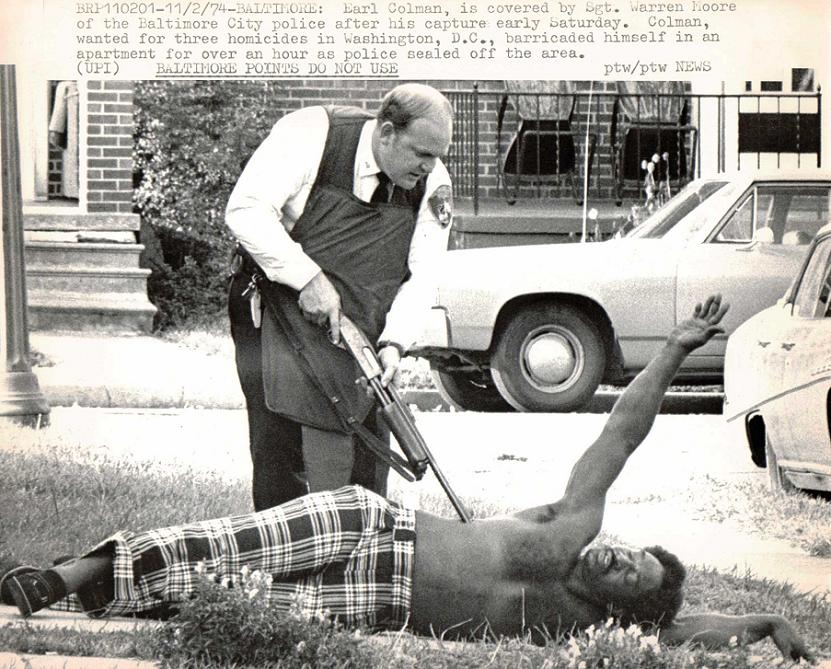
Sgt. Warren Moore captures suspect Earl Coleman, who was wanted in Washington, DC, for three murders.
11-2-1974
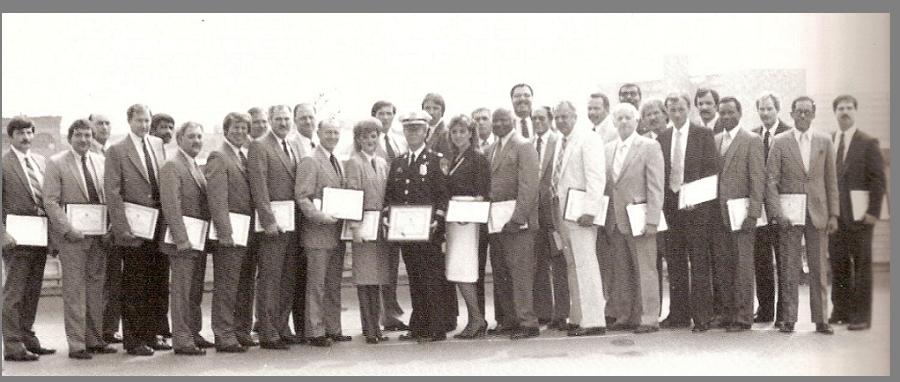
Front: Trawinski, McAllister, Hess, Goldstein, Barrack, D'Addario, Oliver, Cordwell, Cooke, Tinsley-James, Buckhite, Corbin, Fahlteich, Landsman, Lansey, Sweeney, Hollingsworth, Francis, and Segreti. Back: Kurth, Edgerton, Davis, Brander, Kincaid, Dunnigan, Boone, Brown, In the front row, it should be Lansey, (Doc) Davis, and Sweeny; in the back row, it should be Edgerton, Jansen, and Brander. The guy between Doc Davis and Owen Sweeny is Russ Carney.
 Courtesy of Sharon Halligan
Courtesy of Sharon Halligan
 Courtesy of Sharon Halligan
Courtesy of Sharon HalliganDetective William A. Lansey, Jr., Died on August 11, 1987
after having served an honorable career.
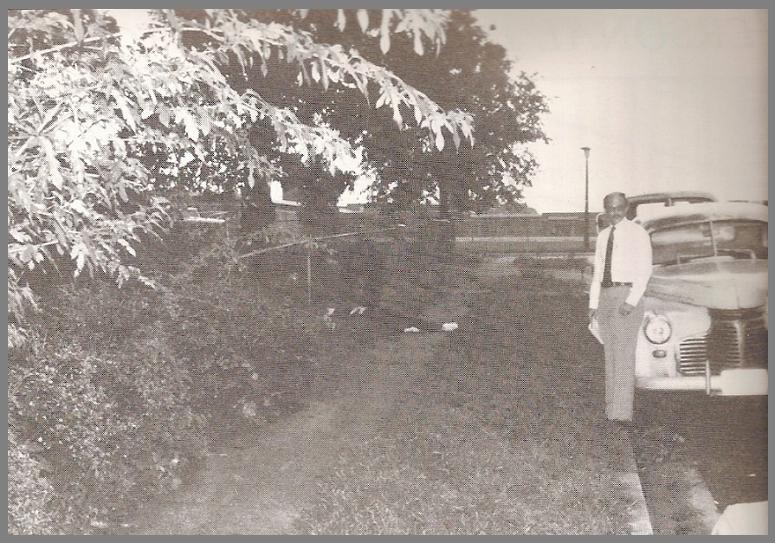
Homicide Detective Richard C. Fahlteich, at the scene of an early morning
homicide/shooting in Northwest Baltimore, August 1987
homicide/shooting in Northwest Baltimore, August 1987

Above: Detective Major Richard C. Fahlteich, Homicide Unit,
preparing a Search and Seizure Warrant during an investigation
of a double homicide or shooting July 1993
preparing a Search and Seizure Warrant during an investigation
of a double homicide or shooting July 1993
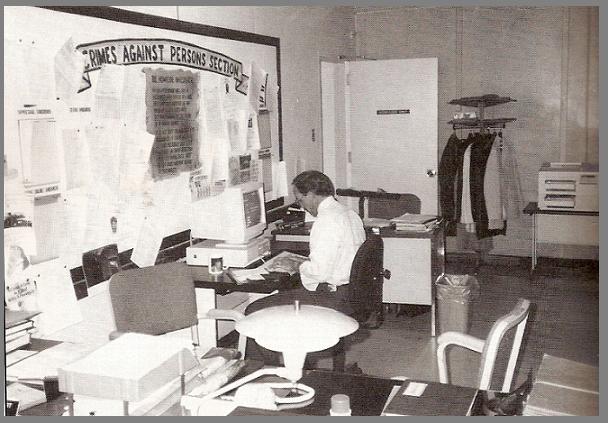
Det Sgt Richard C. Fahlteich
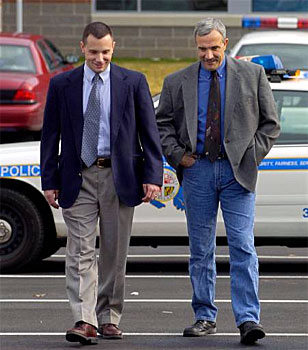
Jay Landsman Sr. (RIGHT) a retired Baltimore City homicide detective
who joined the Baltimore County Police Department, where his son,
Jay Landsman Jr.(left), is a homicide detective. March 18, 2004
who joined the Baltimore County Police Department, where his son,
Jay Landsman Jr.(left), is a homicide detective. March 18, 2004
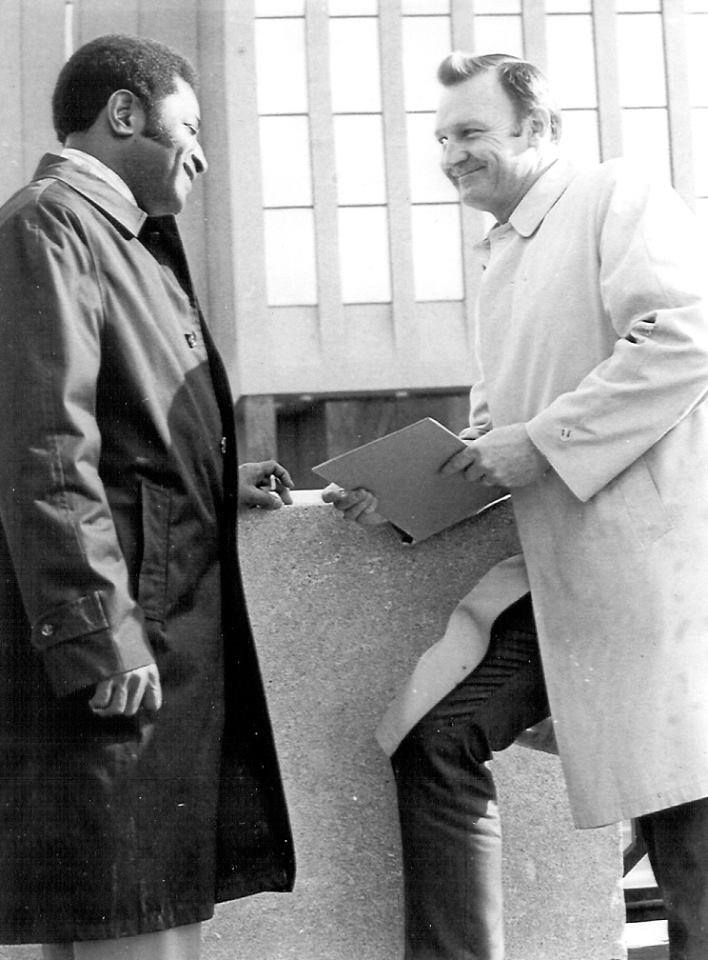
A picture of Baltimore Police history Homicide Unit legends Rod Brandner and Furrie Cousins (Courtesy of Chuck Brandner)
Red Ball
Red Ball
In the nineteenth century, a common signaling arrangement was a ball hoisted on a mast or pole. These were for daylight communication with ships and later for railroads. Two common ball colors used were red and white. There were no industry-wide meanings for such signals; they depended on the rules of the port or road for definition. Typical uses were to show drawbridge status and to require waiting for a train from the opposite direction.
Rail shipment delays were a problem for the railroads, particularly for perishable produce shipments from the west to eastern markets. In 1892, parts of the Santa Fe Railroad implemented priority treatment for certain designated trains. Whether this used, or just made reference to, a red ball track signal for the fast freight is unclear, but in any case, the special trains were called red ball trains and came to have each car carry a placard with routing data and a large red ball printed on them. By 1902, the Santa Fe had this system running on all its main lines, and by a decade later many railroads were using similar priority programs, often called "red ball" systems.
This railroad usage of a red ball for fast transportation became widely known (since the railroads were important in that period). As trucking became established, some companies took on the term in their names: both a Red Ball Transit Company and a Red Ball Motor Freight were formed in the 1920s. Probably the most famous use of the term is the Red Ball Express, which was the truck routing system used in the Normandy campaign of World War II. This symbolic use of the red ball for "priority handling" later came to be applied to important criminal cases.
The Red Ball Express was used to supply the American forces as they swept across Europe bringing much need fuel an ammunition. It got its name from the red balls placed along the route to note that the road was closed to civilian traffic. The RBX was maned primarily African American troops. The 1229 Transportation Company of the MD National Guard was part of the RBX. They were headquartered at the Winchester St. Armory.
Baltimore City Police Department HOMICIDE totals
HOMICIDES BY MONTH: 1970 TO 2005 FROM OFFICIAL UCR DATA
YEAR JAN. FEB. MAR. APR. MAY JUN. JUL. AUG. SEP. OCT. NOV. DEC. TOTAL
1970 13 15 19 24 24 25 13 19 23 20 22 14 231
1971 28 15 18 26 32 23 30 25 21 29 32 44 323
1972 32 22 25 23 19 25 35 45 30 22 26 26 330
1973 35 10 28 12 20 22 31 29 19 17 21 36 280
1974 18 24 18 32 16 28 31 30 20 28 21 27 293
1975 25 14 23 32 12 30 30 15 19 25 16 18 259
1976 21 20 18 14 12 18 25 15 10 13 19 15 200
1977 10 15 14 10 16 12 16 16 09 16 17 20 171
1978 13 14 17 14 21 12 14 17 22 21 13 19 197
1979 17 26 28 19 14 22 21 10 23 23 23 19 245
1980 15 19 16 15 20 18 22 24 22 13 17 15 216
1981 19 20 21 19 16 22 19 20 20 15 18 19 228
1982 24 21 11 13 19 22 24 14 19 18 26 16 227
1983 17 16 12 27 15 07 16 18 18 18 15 22 201
1984 21 22 17 19 19 17 12 14 21 23 21 09 215
1985 16 18 16 20 17 13 13 18 23 16 23 20 213
1986 15 17 21 15 15 20 30 17 26 21 24 19 240
1987 19 18 16 19 12 26 26 26 11 20 12 21 226
1988 21 14 25 24 12 11 20 21 18 19 23 26 234
1989 20 17 18 23 17 23 26 29 24 27 18 20 262
1990 28 25 16 22 22 20 25 42 25 23 23 34 305
1991 31 19 24 29 23 20 18 28 24 31 21 36 304
1992 29 26 20 22 25 28 37 29 34 27 26 32 335
1993 27 25 28 30 29 33 29 35 26 32 30 29 353
1994 22 14 25 29 23 28 28 27 28 35 30 32 321
1995 28 16 29 22 26 25 29 34 29 24 34 29 325
1996 27 16 27 36 32 30 31 39 20 30 19 24 331
1997 29 20 20 21 37 29 20 24 31 23 31 27 312
1998 25 31 27 23 17 32 25 28 34 16 24 31 313
1999 27 14 22 14 22 26 26 25 29 29 36 35 305
2000 24 16 26 33 22 20 28 25 16 19 15 17 261
2001 21 23 16 25 26 26 09 18 16 28 21 27 256
2002 19 17 26 22 21 22 29 14 24 24 18 17 253
2003 23 20 23 26 27 22 25 21 12 18 23 30 270
2004 23 22 21 18 28 25 31 23 27 23 21 14 276
2005 32 13 17 16 27 32 27 21 20 22 22 20 269
2006 275
HOMICIDES BY DISTRICT: 1970 TO 2005
YEAR CD SED ED NED ND NWD WD SWD SD TOTAL
1970 36 28 46 13 9 23 39 18 19 231
1971 45 31 62 14 12 29 71 33 26 323
1972 46 44 40 9 19 29 87 22 34 330
1973 40 32 43 13 15 20 61 28 28 280
1974 42 28 44 16 19 34 60 26 24 293
1975 48 21 31 11 15 33 56 24 20 259
1976 32 18 31 9 11 24 44 17 14 200
1977 25 19 24 9 12 20 35 18 9 171
1978 29 20 26 18 14 17 37 21 15 197
1979 33 25 27 17 15 21 53 33 21 245
1980 32 19 36 18 13 20 34 25 19 216
1981 37 24 44 15 13 23 38 18 16 228
1982 26 25 36 18 14 15 48 22 23 227
1983 28 11 36 14 10 30 39 16 17 201
1984 33 13 43 14 19 25 34 20 14 215
1985 35 13 37 22 11 25 32 20 18 213
1986 24 16 35 22 11 35 48 30 19 240
1987 31 19 38 17 19 36 30 16 20 226
1988 20 24 40 13 20 32 45 25 15 234
1989 32 15 36 25 19 31 45 22 37 262
1990 39 20 43 26 16 39 78 35 9 305
1991 26 33 38 25 16 36 73 43 14 304
1992 34 15 74 17 23 31 86 39 16 335
1993 39 25 83 29 22 42 52 43 18 353
1994 26 17 82 23 27 31 41 41 33 321
1995 26 25 81 34 20 35 42 38 24 325
1996 29 17 68 33 20 44 47 47 26 331
1997 31 27 79 19 20 22 59 37 18 312
1998 26 25 64 24 24 25 47 50 28 313
1999 31 20 54 36 20 54 37 28 25 305
2000 27 18 52 16 22 35 41 27 23 261
2001 23 23 38 30 18 25 50 31 18 256
2002 14 19 60 26 9 27 43 31 24 253
2003 13 20 42 25 25 32 54 32 27 270
2004 12 30 55 28 17 40 38 24 32 276
2005 14 24 35 29 31 30 38 40 28 269
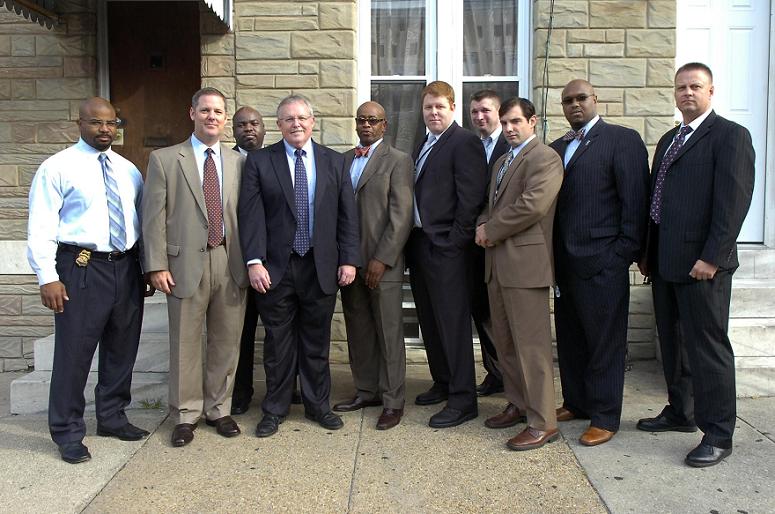
Photo courtesy Detective Robert Ross
BPD Homicide Unit
BPD Homicide Unit
(L-R) Lt. Lenny Willis, Sgt. Ken Norris, Det. Eric Sharp, Major McLarney (Homicide Unit Commander), Det. Marvin Sydnor, Det. Steve Matchett, Det. Sean Jones, Det. Joe Landsman, Det. Jonathan Jones, Det. Robert Ross
![]()
POLICE INFORMATION
Copies of: Your Baltimore Police Department Class Photo, Pictures of our Officers, Vehicles, Equipment, Newspaper Articles relating to our department and or officers, Old Departmental Newsletters, Lookouts, Wanted Posters, and or Brochures. Information on Deceased Officers and anything that may help Preserve the History and Proud Traditions of this agency. Please contact Retired Detective Kenny Driscoll.

NOTICE
How to Dispose of Old Police Items
Please contact Det. Ret. Kenny Driscoll if you have any pictures of you or your family members and wish them remembered here on this tribute site to Honor the fine men and women who have served with Honor and Distinction at the Baltimore Police Department.
Anyone with information, photographs, memorabilia, or other "Baltimore City Police" items can contact Ret. Det. Kenny Driscoll at
Copyright © 2002 Baltimore City Police History - Ret Det Kenny Driscoll

